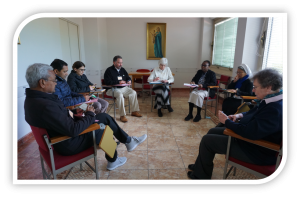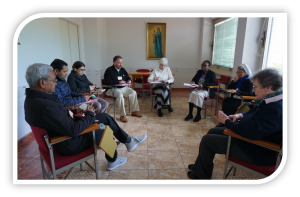ENGLISH
1. Q. What did you gain from this Seminar?
A. The call to strengthen one’s relation to God, self and others, as the basis of my mission, helps foster Universal Communion.
The topic was very appropriate in the current global situation and of great inspiration for any ministry. A lot of insights on how to be a Prophetic Witness for Universal Communion, but most of all a deep desire to live a life based on the principle of non-violence and to promote it every day. Greater commitment to love, compassion, inclusion, listening, and putting the dignity of each person above all else.
The biblical approach, psychological approach, the spirituality and importance of a non-violent approach in our mission/ministry were an eye-opener. I gained courage. The importance of contacts: the need for net-working across congregations and with other like-minded organizations.
…New knowledge and ideas for a better integration of theory and practice. Better grasp of the importance of, and the need for, prophetic witness for Universal Communion. Accompaniment: is not what you give but how you give it. Understand the complexity of the refugee situation and their needs better, so that as Congregations we can respond and cooperate.… Better and deeper understanding of non-violence and its promotion, which is not passive, not even to avoid conflict.
2. Q. Was it helpful for your ministry or mission?
A. Very helpful indeed; also, for intercultural community living. Yes, it brought enlightenment and inspiration. I now have a different approach to this topic. Reflection on the spirituality of non-violence … inspiration for going beyond mission projects owned by small congregations.
Yes. I gained a lot of new skills, among others skills for story-telling, care of self not only for others, but for the sake of the mission and the good of the Team. Adopt the holistic approach … as compassion-mission. Create a support system and a conducive environment.

I learnt various ways to address a non-violent life-style, to practice the spirituality of non-violence and especially how to become more positive. Yes, because it has helped me on my own journey. The content, methods, processes and approaches will be useful in my ministry to teach non-violence and other topics. The insights and what I learned will be shared with my Sisters.
Since our ministries focus on education, non-violence is critical to these ministries. As we increase the interaction of our ministries, this process will help us to plan together.
3. Q. Do you have any suggestions for improvement?
A. Next time, ask someone to speak on the political, economic, social aspects and give a cultural analysis of the current global context.
The personal experiences we shared enriched me. The sharing in groups was wonderful. I much appreciated this opportunity to share, reflect and grow together.
Allow more time for personal reflection (10 mins), before sharing in small groups. The resource people mostly substantiated their in-put with their own experience (impressive accounts), which was very good. More large-group sharing. If possible, have a session like the one with Sr. Sheila earlier in the Seminar. Some were tired and this session involves emotion, which can also be tiring. Being earlier could contribute to our ongoing interaction and sharing during the workshop.
4. Q. Any Other Suggestion?
R. The calm, grace-filled presence of the SEDOS Director was very inspiring.
Everything was well organized and implemented. Just be sure the groups are smaller than 8.
More access to drinking water during the day.
Could the Speakers speak more slowly so that the translators can catch up? Speakers from other conflict zones could be included: sharing from war-torn zones could have been more enriching. Perhaps the Presenters could send their reflection/questions ahead of time so we can reflect before sharing. It would make it easier for Sr. Celine to then send them to the groups without having to wait. Project questions/reflections for groups on a slide so that we don’t have to use cell-phones or lap-tops.
Many thanks go to the Committee. God bless your ministry. Very well done all in all, the Seminar was well-planned, but it mostly focused on JRS; people in Refugee Camps, and post-conflict situations. We could also see the real causes of conflict and how to prevent conflict.
Offer the possibility of on-line participation, as that might bring more participants.
Publish the date and theme as early as possible for planning, as this would give more people the opportunity to experience such a rich encounter. Personal testimonies, like Fr. Pier Luigi Maccalli’s, are always appreciated. Thanks for everything including the warning about the weather. Allow more time for interaction with the resource people. The Speakers were excellent.

Identify other gestures of non-violence. Time for preparation of Liturgy to be considered. Reflect on my life and perceive how God is calling me and preparing me for the mission.
FRANÇAIS
Q. Qu’avez-vous appris de ce séminaire ?
R. L’importance de la Lectio Divino au début de la journée. Être témoin, être un signe prophétique pour la Communion Universelle, la mission, réconciliation, la paix ; l’harmonie, l’accompagnement des victimes de la violence et de la guerre. L’approche non-violente, prière contemplative, soin et silence. La rencontre de nombreuses personnes de congrégations diverses. Beaucoup de bonnes choses et techniques sur la communication et le comportement non-violent.
Ce séminaire m’a beaucoup enrichi par rapport à l’approche de la non-violence pour la résolution des conflits. Ainsi que la manière d’aider les migrantes en les écoutant, en étant attentive à leurs besoins et difficultés.
Q. Est-ce que cela a été utile pour votre ministèreou votre mission ?
R. Oui ! Les expériences d’approches non-violentes, de la compassion, la fécondité de la pratique de la prière … m’ont été très, très utiles pour ma mission et mon ministère. Cependant je dois être moi-même une personne reconciliée et guérie de mes blessures et surtout une personne de prière, car la prière est ma force.
Non, pas tellement. Je n’y ai pas appris grand-chose. Mais j’y ai rencontré des personnes ressources. Le témoignage de P. Luigi Maccalli, fût à mon avis le moment spirituel de ce séminaire. Je remercie le Père Luigi pour sa réfection profonde.
Q. Avez-vous des suggestions d’amélioration?
R. Prévoir le temps de la mise en commun des expériences partagées dans les petits groupes. Laisser plus de temps pour la réflexion personnelle et les rencontres imprévues/ informel.
Q. Autres suggestions ?
R. Je suggère de prévoir le temps de la plénière et des questions afin d’apprendre des autres groupes. La sensibilisation des gens pour avoir un grand nombre de participants aux séminaires et autres activités organisés par SEDOS.
Une journée avec JRS aurait suffi. Il aurait fallu un jour pour advocacy (ex : AEFJN).
Je suis resté sur ma faim en ce qui concerne la spiritualité de la non-violence. L’essentiel était absent !
Se tenir à l’horaire prévu. Utiliser d’autres méthodes de délais pour les rencontres en groupe. Je remercie toute l’équipe de SEDOS pour avoir organisé ce séminaire si riche et si profond. Merci de m’avoir utillé.
ESPAÑOL
P. ¿Qué obtuvo/obtener de este seminario? CHECK
R. Obture màs que conocimiento experiencia de Dios en los ponentes y en los participantes. Verdaderamente me ayudo mucho los testimonios compartidos.
P. ¿Fue útil para su ministerio o mission?
R. Mui útil, especialmente para iniciar un trabajo personal que es por donde hoy que empezos. Amplio mi conocimiento de la realidad de otros lugares.
P. ¿Tiene alguna sugerencia para mejorar?
R. de lo q/dialogo ?? se aprendio y como se transformo. Eso llega más al corazón. Continuar con il trabajo grupal y la dinámica Sinodal de escucha.
P. ¿Alguna otra sugerencia?
R. Hubina ayudado mucho que la ponente Amaya hubina dado su ponencia en español, para habule dado lugar y espacio al espñol y todos tener la oportunidad de usa la traducción, para sensibilizamos en esta necesidad.
Muchos gracias por la oportunidad y continua animando a nos Congregaciones para que participen. Fu un buen gruppo.
ITALIANO
D. Cosa hai imparato da questo seminario?
R. Investire sempre più nella non-violenze ed essere istrumento di comunione nella parola ed azione. Quanto importante sia la nostra missione con i rifugiarti/sfollati: mi ha rinforzato la condizione che siamo tutti fratelli e che mai dobbiamo perdere la speranza che “la non-violenza salverà il mondo”.
Missione in zone di conflitto e guarigione — ci vuole accompagnamento (vicinanza, ascolto empowerment) nel cammino di riconciliazione, lavorare in rete, il dialogo. Il cammino di non-violenza è stato molto utile per la mia missione perché questo è vivere il Vangelo — seguire la Persona di Gesù.
D. E stato utile peril mio ministero o missione?
R. Si, molto. I temi sono stati utile e molto realiste; moderatore e facilitatori sono state molto chiari, e hanno saputo passare il tema. Si, prima di tutto perché ho scoperto che la riconciliazione incomincia da me.
D. Hai qualche suggerimento per migliore?
R. Approfondire l’importanza di lavorare in rete. Perché per affrontare la situazione in zone di conflitto ci vuole la capacità di lavorare insieme/rete. Preferirei che ci fosse più tempo di riflessione personale e meno lavori di gruppo.
Vedere come organizzare meglio il pomeriggio, perché era un po’ difficile di seguire.
D. Qualche altro suggerimento?
R. Più tempo per chi presenta il tema, perché hanno tanta esperienza.


